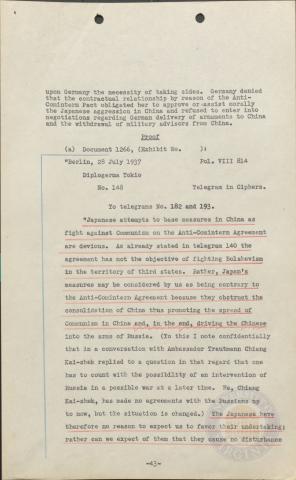
Page 43
| Parent | Collaboration Between Japan, Germany and Italy - Volume II |
|---|---|
| Date | 25 November 1941 |
| Language | English |
| Collection | Tavenner Papers & IMTFE Official Records |
| Box | Box 15 |
| Folder | Japan, Germany, Italy Collaboration Vol 2 |
| Repository | University of Virginia Law Library |
upon Germany the necessity of taking sides. Germany denied that the contractual relationship by reason of the Anti- Comintern Pact obligated her to approve or .assist morally the Japanese aggression in China and refused to enter into negotiations regarding German delivery of armaments to China and the withdrawal of military advisors from China.
Proof
(a) Document 1266, (Exhibit No
Pol. VIII 814
Telegram in Ciphers
"Berlin, 28 July 1937 Dlplogerma Toklo No. 148
To telegrams No. 182 and 193• "Japanese attempts to base measures in China as fight against Communism on the Anti-Comintern Agreement are devious. As already stated in telegram 140 the agreement has not the objective of fighting Bolshevism in the territory of third states. Rather, Japan*s measures may be considered by us as being contrary to the Anti-Comintern Agreement because they obstruct the consolidation of China thus promoting the spread of Communism in China /and, in the end, driving the Chinese into the arms of Russia. (To this I note confidentially that in a conversation with Ambassador Trautmann Chiang Kai-shek replied to a question in that regard that one has to count with the possibility of an intervention of Russia in a possible war at a later time. He, Chiang Kai-shek, has made no agreements with the Russians up to now, but the situation is changed.) The Japanese have therefore no reason to expect us to favor their undertaking; rather can we expect of them that they cause no disturbance
